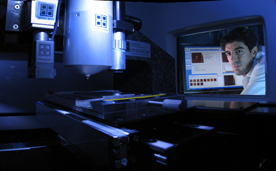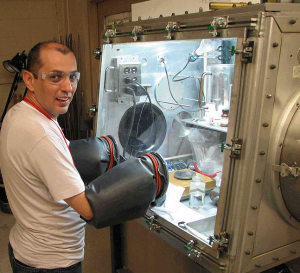
Problem: Before you can finish your research, there's just one final experiment, but you don't have access to the right equipment. What can you do? Well, you can try Science Exchange, a new online company just launched by scientist Elizabeth Iorns and the Y Combinator, a Silicon Valley startup incubator, which wants to make it easier to conduct experiments on the expensive and sometimes rare equipment housed at universities all across the country. Eventually, the company even hopes to reinvent the way scientists outsource research, by making it much more efficient. You might consider it an Ebay for research. They toss around the word "disruptive" a lot.
Cofounder Elizabeth Iorns told Nauturenews that the idea grew out of her own frustration as a researcher:
It was through my work as a breast-cancer biologist at the University of
Miami in Florida. I wanted to conduct some experiments outside my field, and realized that I needed an external provider. What followed was an entirely frustrating process, and when I found the provider it was difficult to pay them because they were outside my university's purchasing system. When I talked to other scientists, it became clear that this was a really big problem, but also one that could be solved with a marketplace. Development of the website started around a kitchen table in Miami in April.
Shortly afterward, she was accepeted at Ycombinator's twice-a-year, three-month boot camp. Where, during 13 intense weeks, she met some of the industry's most skilled innovators. They helped nurture her fledgling idea into a full-blown businesses. Finally, at Demo Day, she pitched her idea to the world's most respected venture capital firms and angel investors and ended up with enthusiastic financial backing.

Now, with management in place and the website up and running, she explained the concept behind it: most major universities have evolved a core facility -- a special lab that houses the most valuable equipment, which can exceed $1 million per machine. That's because it's cost-prohibitive to put them in every scientists' lab, especially since many are only needed occasionally. Typically, university scientists submit their experiments to the core facility, where they're carried out by resource scientists, who then give the results back to the researcher who requested them.
Her company is building a central database that lets researchers easily look up these core facilities all over the country to learn where they can outsource an experiment and how much it will cost. Science Exchange also processes the transactions, so researchers and universities don't have to worry about making sure

their payment systems are all integrated with each other.
And Iorns said that the universities with underutilized core facilities, which typically charge higher fees, can close them without having to worry too much about their faculty leaving, since they'll be able to more easily outsource their experiments. Iorns answered the following questions for Naturenews:
Why might universities want their facilities to participate?
"There are huge budget incentives. It allows institutions to make the most of their existing facilities, which means that they don't have to subsidize them as much. Also, if researchers can use Science Exchange to access the latest equipment, institutions can be more flexible about when they buy new instruments."
How are you intending to make a profit?
"We take a small commission if we match a researcher with a provider and they use us to do the transaction -- 5% for projects under $5,000, which is tiny in comparison with what researchers can save by examining prices from multiple providers. For projects costing more than $5,000, it is a lower commission and a sliding scale: we aren't going to charge $50,000 on a $1-million experiment."
What has the response been like?
"We launched after a short beta period and the growth is crazy. We now have close

to 1,000 scientists using our site and 50-100 signing up every day. More than 70 institutions have providers registered with us, including Stanford University in California, Harvard University in Cambridge, Massachusetts, and, of course, Miami."
So what are you waiting for? Step outside your university's red tape and outsource your research now. You'll be the productive early-adopter of a new trend in research.



